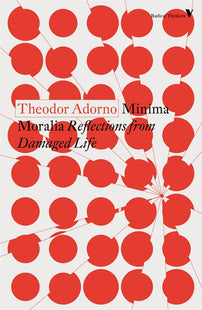Antithesis by Theodor Adorno
The subjugation of life to the process of production imposes as a humiliation on everyone something of the isolation and solitude that we are tempted to regard as resulting from our own superior choice.

As part of our September student reading, we're publishing an excerpt from Theodor Adorno's beloved collection Minima Moralia: Reflections from Damaged Life every day until the end of the month.
All books are 40% off as part of our Student Reading Sale. Ends September 30 at 11:59PM EST. See all our student reading lists here.
Antithesis
He who stands aloof runs the risk of believing himself better than others and misusing his critique of society as an ideology for his private interest. While he gropingly forms his own life in the frail image of a true existence, he should never forget its frailty, nor how little the image is a substitute for true life. Against such awareness, however, pulls the momentum of the bourgeois within him. The detached observer is as much entangled as the active participant; the only advantage of the former is insight into his entanglement, and the infinitesimal freedom that lies in knowledge as such. His own distance from business at large is a luxury which only that business confers. This is why the very movement of withdrawal bears features of what it negates. It is forced to develop a coldness indistinguishable from that of the bourgeois. Even where it protests, the monadological principle conceals the dominant universal. Proust's observation that in photographs, the grandfather of a duke or of a middle-class Jew are so alike that we forget their difference of social rank, has a much wider application: the unity of an epoch objectively abolishes all the distinctions that constitute the happiness, even the moral substance, of individual existence.
We record the decline of education, and yet our prose, measured against that of Jacob Grimm or Bachofen,1 has in common with the culture industry cadences unsuspected by us. Nor do we any longer have the same command of Latin and Greek as Wolf or Kirchhoff. 2
We point at the decline of civilization into illiteracy, and ourselves forget the art of letter-writing, or of reading a text from Jean Paul as it must have been read in his time. We shudder at the brutalization of life, but lacking any objectively binding morality we are forced at every step into actions and words, into calculations that are by humane standards barbaric, and even by the dubious values of good society, tactless. With the dissolution of liberalism, the truly bourgeois principle, that of competition, far from being overcome, has passed from the objectivity of the social process into the composition of its colliding and jostling atoms, and therewith as if into anthropology.
The subjugation of life to the process of production imposes as a humiliation on everyone something of the isolation and solitude that we are tempted to regard as resulting from our own superior choice. It is as old a component of bourgeois ideology that each individual, in his particular interest, considers himself better than all others, as that he values the others, as the community of all customers, more highly than himself. Since the demise of the old bourgeois class, both ideas have led an after-life in the minds of intellectuals, who are at once the last enemies of the bourgeois and the last bourgeois. In still permitting themselves to think at all in face of the naked reproduction of existence, they act as a privileged group; in letting matters rest there, they declare the nullity of their privilege. Private existence, in striving to resemble one worthy of man, betrays the latter, since any resemblance is withdrawn from general realization, which yet more than ever before has need of independent thought. There is no way out of entanglement. The only responsible course is to deny oneself the ideological misuse of one's own existence, and for the rest to conduct oneself in private as modestly, unobtrusively and unpretentiously as is required, no longer by good upbringing, but by the shame of still having air to breathe, in hell.
1. Jacob Grimm (1785-1863): founder of German philology as a systematic discipline, as well as collector of German folk-tales. Johann Jakob Bachofen (1815-87): romantic historian of ancient law and myth, author of the famous work Das Mutterrecht (1861).
2. Friedrich-August Wolf (1759-1824): classical philologist who first investigated the origins of Homeric poetry-a friend of Goethe and Humboldt. Adolf Kirchhoff (1826-1905): German classical scholar of the later nineteenth century.
